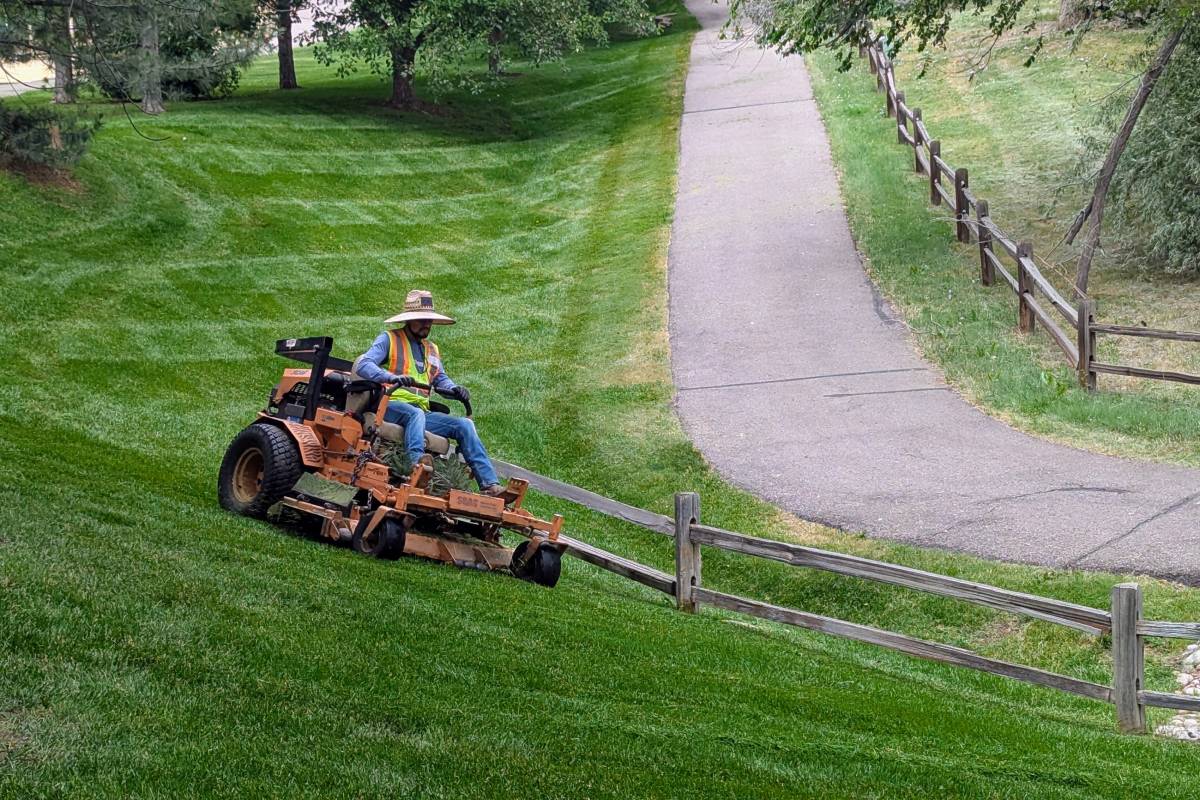
Tom Vilsack, the U.S. Secretary of Agriculture, said the next round of federal help for farmers includes an effort to directly address the discrimination farmers of color have faced by the federal government.
“This provision in the American Rescue Plan is designed to provide debt relief as a way of responding to the cumulative effect of discrimination, and also to recognize that in previous COVID relief packages, white farmers received anywhere from 95 to 99 percent of the nearly $30 billion that was paid out in those previous COVID relief packages,” Vilsack told Colorado Matters.
He also said it’s important to ensure farmers in rural Colorado have not only access to broadband connectivity, but connectivity that is fast.
“Broadband basically provides you the ability to access information and data from your tractor, from your combine, from other sources that enables you to have a better understanding of precisely how best to farm that acre,” Vilsack said. “It also gives you access … to real-time market information, which allows you to make difficult and sometimes timely decisions about when to sell and when to purchase.”
Tom Vilsack also served as the ag secretary under President Barack Obama, and for years was an advisor on food and water to Colorado State University.
Interview Highlights
On The Need For Rural Broadband Equity
“It is a very deep concern, and the COVID situation has underscored the reliance that we have. Rural schools have found it difficult for their students to have access to the information when schools had to be shut down. We obviously have to expand access to health care in creative ways. Not every county has a hospital, not every city has a clinic. So the ability to expand telehealth, certainly important. Mental health services, critically important during a very difficult time economically and from a healthcare standpoint. So the $100 billion that is allocated and outlined in the American Jobs Plan would be designed to basically finally get to a point where everyone would not only have access to broadband, but high speed access. We can't have a digital divide here where I have the ability to get information quickly and you have dial-up speed in a remote community. We need to make sure that this is treated just in the same way we treated rural electrification, where everybody has access to electricity.”
On The Need For Debt Relief For Socially Disadvantaged Farmers
“The law is very clear about who's included in the socially disadvantaged farmers. It's tied to a definition from a 1990 law, and essentially deals with those who have been discriminated against by virtue of race or ethnicity. And so, as a result, you're dealing with Black African-American farmers, you're dealing with Hispanic farmers, you're dealing with Native American farmers. These individuals and these farmers were discriminated against for an extended period of time by the Department of Agriculture, which meant that they didn't have access to loans, or when they got loans, they got them late, or they got them an interest rate that was higher, where their costs were higher. As a result, they didn't have the ability to grow, expand, and to fully utilize the services and programs available for USDA throughout the last 20, 30 years.
We have reimbursed people for the actual specific acts of discrimination in a number of class action settlements that took place during the Obama administration. What we haven't dealt with was the cumulative effect, that gap that now exists between those who had full access to all of USDA programs for that period of time and those who did not.
And so this bill, this provision in the American Rescue Plan, is designed to provide debt relief as a way of responding to the cumulative effect of discrimination, and also to recognize that in previous COVID relief packages, white farmers received anywhere from 95 to 99 percent of the nearly $30 billion that was paid out in those previous COVID relief packages. Just to give you a sense of this, the magnitude of difference, if you take a look at those producers who have self-identified, our forms allow you to self-identify whether you're White or African-American, whatever. About 25 percent of the people that responded to COVID, that received COVID payments self-identified as one category or another. Of that 25 percent, Black farmers received a little over $20 million of assistance and help, while white farmers received close to $6 billion in help and assistance. So this proposal is designed in part to respond to that gap in terms of relief and assistance, and also the cumulative effect of discrimination.”
On Climate Change And Wildfires
“The key here is having resources, significant resources behind an effort to properly maintain our forests. The reality is that we've not invested in what we need to invest to have proper forest management. And the result is that there's been a hazardous fuel buildup over decades, which is now causing these horrific fires. That's why it's important. I know Senator Bennet and others have proposed a significant investment. And I think you're going to see from both the American Jobs Plan and the budget that President Biden is going to submit, you're going to see increased investment in wildland maintenance, fire maintenance over the course of the next several years, which is going to begin the process of putting us in a better spot. Look, we can do everything possible that the president wants done to get to zero-emission agriculture by the year 2050, but all of that could be wiped out by not properly maintaining our forests and having these fires continue at the rate and the intensity that we've seen recently. So it is time for us to get serious about this.”
Read the Transcript
Ryan Warner: “Farming, ranching, and forests, all part of Colorado's identity, and all fall under the purview of the U.S. Department of Agriculture. President Biden's pick to lead the ag department as climate change transforms fields and forests is Tom Vilsack, a name that may be familiar to you. Vilsack had the job before under President Obama and he was a special advisor to Colorado State University on food and water. And Secretary Vilsack, welcome back.”
Tom Vilsack: “Oh, it's good to be back. Thanks.”
RW: “One of the issues the pandemic has really spotlighted is rural broadband access. And so the USDA plans to make more investments there. Can you give us examples of why fast internet is an agricultural issue at heart?”
TV: “Well, we're excited about the opportunities that the American Jobs Plan has for expanding broadband to even the most remote areas. Farmers are very interested in utilizing inputs wisely. It's called precision agriculture. Each acre of ground is different. The more you know about each acre, the better you can be in terms of the stewardship responsibilities you have. And so broadband basically provides you the ability to access information and data from your tractor, from your combine, from other sources that enables you to have a better understanding of precisely how best to farm that acre. Secondly, it also gives you access, broadband gives you access to real-time market information, which allows you to make difficult and sometimes timely decisions about when to sell and when to purchase. So it's an important consideration from a marketing perspective and an income perspective as well.”
RW: “So this is fundamentally about a farmer's bottom line. I think in 2021, there are probably city folk listening, thinking, ‘Really?" There are places in this country that simply do not have that sort of access.” This is an urgent problem in some parts of rural America.”
TV: “Well, it is a very deep concern, and the COVID situation has underscored the reliance that we have. Rural schools have found it difficult for their students to have access to the information when schools had to be shut down. We obviously have to expand access to health care in creative ways. Not every county has a hospital, not every city has a clinic. So the ability to expand telehealth, certainly important. Mental health services, critically important during a very difficult time economically and from a health care standpoint. So the $100 billion dollars that is allocated and outlined in the American Jobs Plan would be designed to basically finally get to a point where everyone would not only have access to broadband, but high speed access. We can't have a digital divide here where I have the ability to get information quickly and you have dial-up speed in a remote community. We need to make sure that this is treated just in the same way we treated rural electrification, where everybody has access to electricity.”
RW: “Comparing it to rural electrification. And it's fascinating to hear you draw the line there between the needs of farmers in the fields, for instance, but also their health care needs in these rural places. So of the American Rescue Plan, I want to ask you, this was signed in March by the president. It included debt relief to "socially disadvantaged farmers." Whom does that describe and why do they need debt relief?”
TV: “Well, the law is very clear about who's included in the socially disadvantaged farmers. It's tied to a definition from a 1990 law, and essentially deals with those who have been discriminated against by virtue of race or ethnicity. And so, as a result, you're dealing with Black African-American farmers, you're dealing with Hispanic farmers, you're dealing with Native American farmers. These individuals and these farmers were discriminated against for an extended period of time by the Department of Agriculture, which meant that they didn't have access to loans, or when they got loans, they got them late, or they got them an interest rate that was higher, where their costs were higher. As a result, they didn't have the ability to grow, expand, and to fully utilize the services and programs available for USDA throughout the last 20, 30 years. We have reimbursed people for the actual specific acts of discrimination in a number of class action settlements that took place during the Obama administration. What we haven't dealt with was the cumulative effect, that gap that now exists between those who had full access to all of USDA programs for that period of time and those who did not. And so this bill, this provision in the American Rescue Plan, is designed to provide debt relief as a way of responding to the cumulative effect of discrimination, and also to recognize that in previous COVID relief packages, white farmers received anywhere from 95 to 99 percent of the nearly $30 billion that was paid out in those previous COVID relief packages. Just to give you a sense of this, the magnitude of difference, if you take a look at those producers who have self-identified, our forms allow you to self-identify whether you're white or African-American, whatever. About 25 percent of the people that responded to COVID, that received COVID payments self-identified as one category or another. Of that 25 percent, Black farmers received a little over $20 million of assistance and help, while white farmers received close to $6 billion in help and assistance. So this proposal is designed in part to respond to that gap in terms of relief and assistance, and also the cumulative effect of discrimination.”
RW: “Cumulative effect. That is, there are immediate instances of this discrepancy of this gap, but there are also historical examples. So this goes back certainly much further than the pandemic. I'd like to talk about climate change, Secretary Vilsack. Last year, Colorado saw the biggest wildfire in its recorded history, consuming just vast acreages. Heading into summer, how can the forest service, which of course falls under USDA, help Western states, especially, where there's so much federal land that can burn?”
TV: “Well, the key here is having resources, significant resources behind an effort to properly maintain our forests. The reality is that we've not invested in what we need to invest to have proper forest management. And the result is that there's been a hazardous fuel buildup over decades, which is now causing these horrific fires. That's why it's important. I know Senator Bennet and others have proposed a significant investment. And I think you're going to see from both the American Jobs Plan and the budget that President Biden is going to submit, you're going to see increased investment in wildland maintenance, fire maintenance over the course of the next several years, which is going to begin the process of putting us in a better spot. Look, we can do everything possible that the president wants done to get to zero-emission agriculture by the year 2050, but all of that could be wiped out by not properly maintaining our forests and having these fires continue at the rate and the intensity that we've seen recently. So it is time for us to get serious about this.”
RW: “What does it mean to manage a forest? What does that look like on the ground? Is that logging? Is that prescribed burns? Practically, what would additional dollars be spent on?”
TV: “It's a combination of things. It's reforestation. It's cleaning out the hazardous debris that has accumulated over time. It's, in some cases, a prescribed burn. It's a combination of efforts by the forest service based on the science, based on the particular forest in question and its needs to essentially reduce the risk of these horrific forest fires, and to make sure that as well, that the communities that are in and around and dispersed throughout these forested areas are also protected, again, as best they can be against a fire that gets out of control.”
RW: “You see this as just being an area of really underinvestment, do I hear you right?”
TV: “There's no question about that. There's absolutely no question about it. I mean, you need billions of dollars a year to do the job right. During the Obama administration, we encouraged Congress to pass a fire fix, which would have allowed us to have access to additional resources. It was not done until President Trump became president, but unfortunately it was not utilized as effectively during the Trump administration. So the expectation and anticipation is that we will use those additional resources that will now be available, but there needs to be significant resources added on top of that because of the accumulation of so much hazardous fuel in the past several decades; I mean, it's not a situation that occurred overnight and it's not a situation that will necessarily be solved overnight, but we need to make aggressive steps now.”
RW: “You mentioned the Trump administration. And during that administration, the federal government imposed tariffs on goods imported from China, which led China to impose its own tariffs on goods from the U.S., and this led to a huge squeeze on U.S. agriculture. Will this trade war continue much further into the Biden administration?”
TV: “Well, under the phase one trade agreement, China has increased significantly its purchases, and it is now pretty much at the level they were in before the pandemic and before the trade war. So all of that is good, but it's a complicated relationship we have with China. In some cases it's complementary, in some cases it's collaborative. In some cases, it's a matter of conflict and competition. The concern is that we maintain that balance so that whatever happens in the South China Sea, or with reference to Taiwan or Hong Kong or protection of minorities in China, that that it is done in a way that allows the cooperative aspect of our relationship to continue so that we continue to have the ability to sell product to China. I would say that the lesson to be learned from all of this is two lessons. One, if you're going to do something against China, you don't do it alone, you do it with the rest of the world, and the Biden administration is now in the process of putting together the alliances that should have been put together before to confront China as a global community. And then secondly, we have to diversify in agriculture, our markets, that we can't be overly dependent on a single market to be able to support it, exports. We need to figure out how to get a deeper presence in more markets across the world so we're not as reliant on China as we have been.”
RW: “Have farmers and ranchers made up for the losses caused by that trade war?”
TV: “No. It's going to take a while for them to make up for the losses. They are just back to where they were in 2017, before the trade war, in terms of a level of exports and a level of sales. It's going to take some time for those sales to increase, for us to continue to expand opportunity on the export side, for them to in essence make up for the lost income they suffered during the first two or three years of that trade dispute.”
RW: “Meanwhile, there is some concern among producers that the Biden administration will mean a lot of layers of bureaucracy that could make their jobs harder. High profile outbreaks of E. coli led your former boss, President Obama, to sign the Food Safety and Modernization Act, which allows the FDA to regulate how food is grown, harvested, processed. President Trump indefinitely delayed enforcement. What do you say to those who worry that something like this might force smaller operations to close? Do you share that fear, first off?”
TV: “Well, not necessarily because the law doesn't necessarily apply to every farming operation. There are smaller operations that don't necessarily have to comply with the full range of requirements under the Food Safety Modernization Act. I would say the worst thing that can happen to a farmer is for there to be a food safety outbreak, because it not only impacts and affects the particular farmer that may have provided unsafe product, but it also affects the entire industry and the entire market. We have seen a number of fruits and vegetables be impacted by a food channel, or a food problem, a food safety issue. And we've seen the market, it takes quite some time for it to rebound. So I think it's in everyone's best interest to make sure that we have safe food and it's in everybody's interest that we also make sure that we have nutritious food as well, available to all of the people in this country.”
RW: “In Colorado, you need look no further than cantaloupe for instances of how foodborne outbreaks can affect an industry. But you do not find that law to be overly cumbersome, in just the last few seconds.”
TV: “I don't think so. I think there are plenty of ways in which assistance is being provided for folks to be able to comply with the law. And again, it's in their best long-term interest to make sure that the food that is provided to American families is safe, and the food that we export to other families around the world is safe.”
RW: “Secretary, I appreciate your time. Thanks so much for it.”
TV: “Thank you.”









